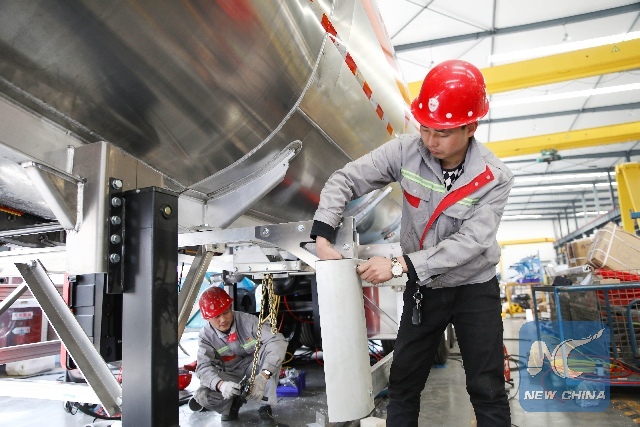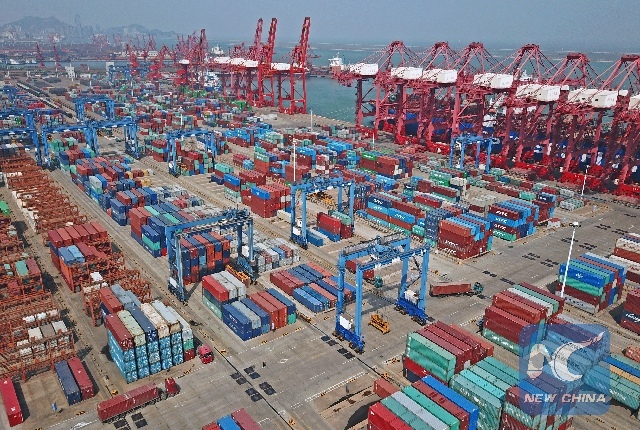By Xinhua writers Wang Xiuqiong and Cheng Jing
BEIJING, April 17 (Xinhua) -- China's economy delivered a solid start to the year with above-target growth in the first quarter, demonstrating its resilience amid escalating trade tensions with the United States.
The country's GDP expanded 6.8 percent year on year at comparable prices in the first three months of 2018, unchanged from the growth rate in the previous quarter, the National Bureau of Statistics (NBS) said Tuesday.
"The economy is off to a good start," NBS spokesperson Xing Zhihong told a press conference, noting that the quarterly performance laid a good foundation for sustained, healthy growth for the whole year.

Workers assemble tank cars at a factory in Lianyungang of east China's Jiangsu Province, April 16, 2018. (Xinhua/Si Wei)
The GDP growth rate has stayed within the range of 6.7 percent to 6.9 percent for 11 consecutive quarters, with the jobless rate and inflation remaining stable, he said.
The solid first-quarter performance extended the economic strength of last year, when China's GDP logged 6.9-percent growth, picking up the pace for the first time in seven years.

Graphics shows the Chinese economy saw a solid start to the year with a 6.8-percent growth in the first quarter, official data showed on April 17, 2018. (Xinhua/Lu Zhe)
It was welcome news as aggressive protectionist moves by the U.S. administration added uncertainty to the world economy.
In the first quarter, China's industrial output and fixed-asset investment growth eased from the January-February period, but retail sales, private investment and property investment growth accelerated, the NBS data showed.
Xing attributed the moderation of some indicators to seasonal factors as the Spring Festival came later this year than previous years and affected production.
"Looking ahead, the favorable conditions and factors to support high-quality development are increasing, and the economy will continue to maintain stable development with a positive outlook," he said.
Zhang Zhanbin, an economist at the Chinese Academy of Governance, said China will fulfill its goal of achieving GDP growth of around 6.5 percent this year.

Graphics shows the Chinese economy saw a solid start to the year with a 6.8-percent growth in the first quarter, official data showed on April 17, 2018. (Xinhua/Meng Lijing)
CONSUMPTION "BRIGHT SPOT"
Commenting on Tuesday's data, Asian investment bank Nomura said the "bright spot" was retail sales.
Retail sales growth accelerated to a higher-than-expected 10.1 percent in March from 9.7 percent in January-February, NBS data showed.
"This is a good sign that growth is rebalancing from investment to consumption," Nomura said. "Indeed, underneath the very stable GDP growth over the past five quarters has been a continued rapid rebalancing, from old economy industrial sectors and investment toward new economy sectors like tech and services, as well as consumption."

Residents buy seafood at a supermarket in Fuzhou, capital of southeast China's Fujian Province, Feb. 8, 2018. (Xinhua/Zhang Guojun)
The transition was part of China's bid to steer its economy toward high-quality development rather than growth based on inefficient investment, low-end exports and polluting factories.
Services accounted for 56.6 percent of the economy and 61.6 percent of its growth in the first quarter, the NBS data showed.
Final consumption contributed to 77.8 percent of the economic growth, up from 58.8 percent last year.
Meanwhile, new businesses and industries continued to grow fast, and the industrial sector steadily upgraded toward medium- and high-end production, according to Xing.
TRADE TENSIONS MANAGEABLE
The structural shift of China's economy is also key to its effort to cope with pressure from rising protectionism, a threat highlighted by the NBS spokesperson.
"The biggest [difficulty facing China's economy] is uncertainty in the international environment," he said.
Xing said China is "fully capable" of handling trade tensions with the United States, citing the country's increasingly domestic-led growth, growing innovative edge, and ample room for development and policy control.
"The economy has plenty of resilience, potential and leeway. The Sino-U.S. trade frictions cannot stump the Chinese economy, nor can they change its sound momentum of sustained and healthy growth," he told reporters.

Photo taken on April 13, 2018 shows a container wharf in the harbour of Lianyungang, east China's Jiangsu Province. (Xinhua/Geng Yuhe)
As an upgrading market in China increases demand for high-end products, domestic sales can partially offset the adverse impact of external factors, said Wang Changlin, an economist at the National Development and Reform Commission (NDRC).
Domestic demand contributed 105.7 percent of China's economic growth on average annually from 2008 to 2017, according to Xing.
While drawing attention to a narrowing trade surplus, Xing said the country is opening up further.
China earlier this month unveiled a number of landmark measures to be taken this year to significantly broaden market access, from significantly lowering import tariffs for vehicles to opening up the financial sector.
"China does not seek trade surplus and is continuously expanding imports," said Bai Ming, researcher with the Chinese Academy of International Trade and Economic Cooperation. "This will bring new opportunities for other countries to share the market dividends of China." Enditem
(Xinhua reporters Rong Jiaojiao, Chen Yongrong, Zhang Zhongkai, Zheng Xin, Chen Weiwei and Shen Cheng also contributed to the story. Video editors: Zhu Jianhui, Mu Xuyao)

